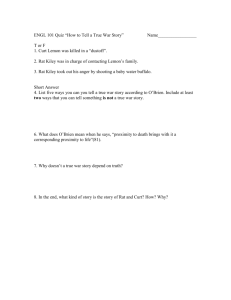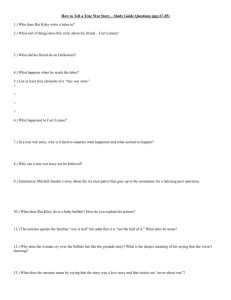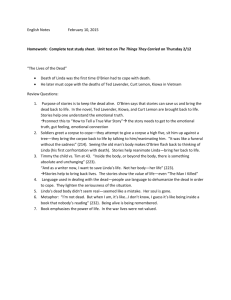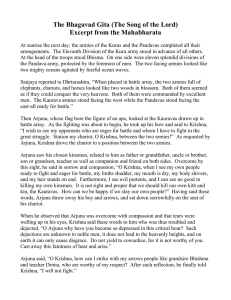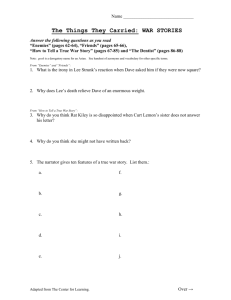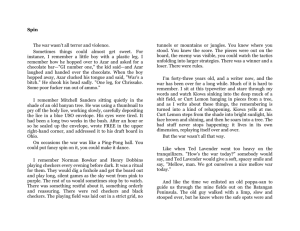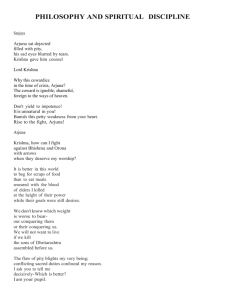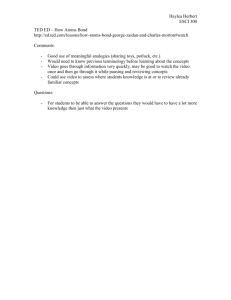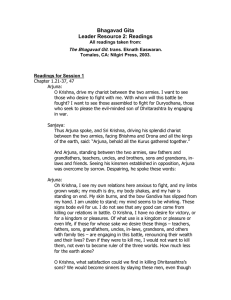Jungle Fever: Loss and Death in War
advertisement
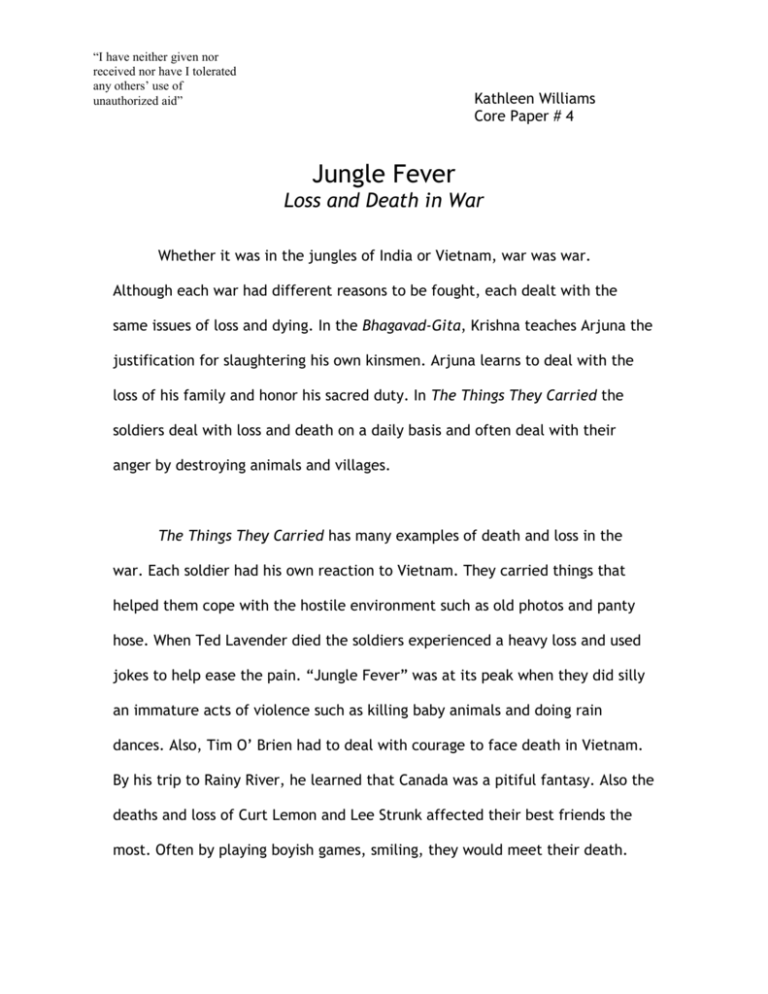
“I have neither given nor received nor have I tolerated any others’ use of unauthorized aid” Kathleen Williams Core Paper # 4 Jungle Fever Loss and Death in War Whether it was in the jungles of India or Vietnam, war was war. Although each war had different reasons to be fought, each dealt with the same issues of loss and dying. In the Bhagavad-Gita, Krishna teaches Arjuna the justification for slaughtering his own kinsmen. Arjuna learns to deal with the loss of his family and honor his sacred duty. In The Things They Carried the soldiers deal with loss and death on a daily basis and often deal with their anger by destroying animals and villages. The Things They Carried has many examples of death and loss in the war. Each soldier had his own reaction to Vietnam. They carried things that helped them cope with the hostile environment such as old photos and panty hose. When Ted Lavender died the soldiers experienced a heavy loss and used jokes to help ease the pain. “Jungle Fever” was at its peak when they did silly an immature acts of violence such as killing baby animals and doing rain dances. Also, Tim O’ Brien had to deal with courage to face death in Vietnam. By his trip to Rainy River, he learned that Canada was a pitiful fantasy. Also the deaths and loss of Curt Lemon and Lee Strunk affected their best friends the most. Often by playing boyish games, smiling, they would meet their death. Each soldier humped things to help them cope with death and loss in Vietnam. Jimmy Cross would carry the letters of Martha and her pebble in his mouth. He fantasized a romantic relationship between them, such as caressing her knee or walking with her on the seashore. By fantasying about Martha, Jimmy Cross would escape from the hostile war and into a dreamful state. Martha was his way to cope. Henry Dobbins carried his girlfriend’s panty hose around his neck. This gave him comfort and good luck, even when he had broken up with her. Tranquilizers helped Ted Lavender remain “mellow” during the war. Each morning he popped a few in and smoked some of his dope. He remained in a peaceful state throughout the day, even till the day he was shot. His comrades thought that he did not feel a thing. The Bible comforted the religious Indian, Kiowa throughout the Vietnam War. The soldiers had mixed reactions when Ted Lavender was shot in the headquarters outside the village of Than Khe in mid-April. He was dead weight. There was no twitching or flopping. Kiowa, who saw it happen, said it was like watching a rock fall, or a big sandbag or something- just boom, then down- not like the movies where the dead guy rolls around and does fancy spins and goes assover tealike- not like that, Kiowa said, the poor bastard just flat-fuck fell. Boom. Down. Nothing else (page 6). The soldiers joked how he had dropped down fast. “Cement,” Kiowa would say, “Greased. Offed.. litup, zapped while zipping” (page 20). After wrapping his body in his poncho, they sat smoking the dead man’s dope while waiting for the chopper to come. Someone asked Ted how the war was today. The answer was as usual, “Mellow”. They talked to the dead as if it were still living. The chopper was a “wonderful ride”, an escape from the jungle. Jimmy Cross blamed himself. If he had not fantasized about Martha so often and have paid more attention to his duties, Ted Lavender would still be alive. On the morning after Ted Lavender died, First Lieutenant Jimmy Cross crouched at the bottom of his foxhole and burned Martha’s Letters (p 24). Lavender was dead. You couldn’t burn the blame (p 23). From that pint on, Jimmy Cross kept his promise and increased his duties and command. Each person had jungle fever. Most of the soldiers were under twenty years of age. They did a lot of random wacky acts of craziness. On Halloween Curt Lemon dressed stark naked covered with paint. He carried a rife and went “trick-or-treating” from door to door. Another funny moment was when Kiowa taught a rain dance to Rat Kiley and Dave Jenson. The three of them whooping and leaping around barefoot while a bunch o villagers looked on with a mixture of fascination and giggly horror. Afterward, Rat said,” So where’s the rain?” and Kiowa said,” The earth is slow, but the buffalo is patient,” and Rat thought about it and said, “Yeah, but where’s the rain?” (pg 36) . They often chanted songs while humping, “Step out of line, hit a mine, follow the dink, you’re in the pink” (p 33). Once Mitchell Sanders took some of his hair lice and deposited it into a blue USO envelope and wrote free in the upper right hand corner and addressed it to his draft board in Ohio. The jungle fever got to them badly. They burned as many villages as they wanted to. They had freedom in the land, except they could not fly away from Vietnam. The country was theirs for the taking; no one was restricting them to good behavior. Death was the only escape. Sometimes when a person died, one of the dead man’s mates went crazy. Azar strapped the puppy that Ted Lavender had nurtured to a Claymore antipersonnel mine and squeezed the firing device. The jungle fever caused men to pillage the villages, rape women, and burn everything in sight. Once some of the soldiers imagined that they heard ballroom dancing and cocktail parties high up in the mountains. They ordered the plans to burn the entire mountains. The mountains smoked, but there were no parties in the mountains. Loss and death affected Tim O’Brien the most during the summer before he left for the war. He worked at a pig factory on an assembly line to help declot the pigs. When he first received the notice of draft he put it aside and did not think much about it. He planned on attending graduate school next fall at Harvard. He felt that he was too good for the war, an intellectual. He thought that there should be a law that made people in favor of the war fight it. Tim then imagined death in the war. One day while working on the assembly line, he cracked and left for Canada. He drove until he reached the Tip Top fishing resort in the town of Rainy River. An old man named Elroy was kind to him, like he had sheltered a cat. Most importantly Elroy never asked questions. At the fishing resort, Tim realized just how fruitless his dreams of escape to Canada were. He did not want to lose respect from his parents and he feared ridicule from the people in his hometown for ditching the draft. He drove home and made his decision to fight. Rat Kiley and Curt Lemon were best buddies. They often played the funniest of invented games such as playing catch with smoke grenades. One day they were in the happiest of spirits when Curt Lemon stepped on a boobytrapped 105 round. It was over before they had realized what had happened. Curt Lemon was blown up and his parts were hanging from a tree. The other soldiers sang Lemon Tree while tossing down the guts and gore of Curt Lemon. Rat Kiley took his anger out on a baby buffalo. He slowly shot it from head to tail so that it would feel pain. The baby buffalo had died slowly and had a glare of aliveness in its eyes when Rat Kiley was finished with him. The Bhagavad-Gita also has many examples of loss and death. In the Bhagavad-Gita Krishna teaches Arjuna the principles of life and death. He teaches him to understand his own and other’s mortality. He explains the relationship between death, sacrifice, and devotion that coveys the idea that one most heroically confront death in order to transcend the limits of worldly existence. One must perform one’s sacred duty even when it requires violence. Arjuna learns the principles of duty, discipline, action, knowledge, and devotion. All action is to be both performed without attachment to the fruits of the action and dedicated with loving devotion to Krishna. By purging his mind of attachments and dedicating the fruits of his action to Krishna, Arjuna can continue to act in a world of pain without suffering despair. Be intent on action. Not on the fruits of the action, avoid attraction to the fruits and attachment to inaction (page 36). Perform actions, firm in discipline, relinquishing attachment, be important to failure and success- this equinanimity is called discipline (p 36). Krishna told Arjuna to act with detachment. Discipline enables the warrior Arjuna to control his passions and become a man of discipline. At the start of the war Arjuna did not want to fight. Arjuna saw them standing there fathers, grandfathers, teachers, uncles, brothers, sons, grandsons, and friends (page 24). He believed that the family and society would be corrupt if he killed his own kinsmen. Krishna calls Arjuna a coward for not obeying his sacred duties and explains the essence of the atman, or soul. “Never have not existed, not you; nor these kings; and in the future shall cease to exist (p. 31).The self does not die, it is destructible “Death is certain for anyone born, and birth is certain for the dead, since the cycle is inevitable, you have no cause to grieve (p33). Krishna learns that when his kinsman die, they will be reborn again. It is sacred duty to kill them and gain merit for his soul. He should devote himself to Krishna. Each book The Things They Carried and The Bhagavad-Gita had many examples of how people dealt with loss and death in war. In the Things They Carried, the soldiers often jokes about death but when faced with it, took their anger out on the animals and the local villages by destroying everything. Each carried something with them to help them cope. The jungle fever distorted their minds and attitudes to cope with the atrocities of war.
